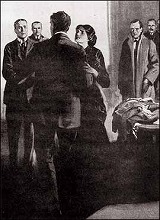The proceedings seemed to have come to a definite end so far as he was concerned; for one had only to look at that granite face to realize that no peine forte et dure would ever force him to plead against his will. The deadlock was broken, however, by a woman’s voice. Mrs. Douglas had been standing listening at the half opened door, and now she entered the room.
“You have done enough for now, Cecil,” said she. “Whatever comes of it in the future, you have done enough.”
“Enough and more than enough,” remarked Sherlock Holmes gravely. “I have every sympathy with you, madam, and I should strongly urge you to have some confidence in the common sense of our jurisdiction and to take the police voluntarily into your complete confidence. It may be that I am myself at fault for not following up the hint which you conveyed to me through my friend, Dr. Watson; but, at that time I had every reason to believe that you were directly concerned in the crime. Now I am assured that this is not so. At the same time, there is much that is unexplained, and I should strongly recommend that you ask Mr. Douglas to tell us his own story.”
Mrs. Douglas gave a cry of astonishment at Holmes’s words. The detectives and I must have echoed it, when we were aware of a man who seemed to have emerged from the wall, who advanced now from the gloom of the corner in which he had appeared. Mrs. Douglas turned, and in an instant her arms were round him. Barker had seized his outstretched hand.

“It’s best this way, Jack,” his wife repeated; “I am sure that it is best.”
“Indeed, yes, Mr. Douglas,” said Sherlock Holmes, “I am sure that you will find it best.”
The man stood blinking at us with the dazed look of one who comes from the dark into the light. It was a remarkable face, bold gray eyes, a strong, short-clipped, grizzled moustache, a square, projecting chin, and a humorous mouth. He took a good look at us all, and then to my amazement he advanced to me and handed me a bundle of paper.
“I’ve heard of you,” said he in a voice which was not quite English and not quite American, but was altogether mellow and pleasing. “You are the historian of this bunch. Well, Dr. Watson, you’ve never had such a story as that pass through your hands before, and I’ll lay my last dollar on that. Tell it your own way; but there are the facts, and you can’t miss the public so long as you have those. I’ve been cooped up two days, and I’ve spent the daylight hours - as much daylight as I could get in that rat trap - in putting the thing into words. You’re welcome to them - you and your public. There’s the story of the Valley of Fear.”
“That’s the past, Mr. Douglas,” said Sherlock Holmes quietly. “What we desire now is to hear your story of the present.”
“You’ll have it, sir,” said Douglas. “May I smoke as I talk? Well, thank you, Mr. Holmes. You’re a smoker yourself, if I remember right, and you’ll guess what it is to be sitting for two days with tobacco in your pocket and afraid that the smell will give you away.” He leaned against the mantelpiece and sucked at the cigar which Holmes had handed him. “I’ve heard of you, Mr. Holmes. I never guessed that I should meet you. But before you are through with that,” he nodded at my papers, “you will say I’ve brought you something fresh.”
Inspector MacDonald had been staring at the newcomer with the greatest amazement. “Well, this fairly beats me!” he cried at last. “If you are Mr. John Douglas of Birlstone Manor, then whose death have we been investigating for these two days, and where in the world have you sprung from now? You seemed to me to come out of the floor like a jack-in-a-box.”